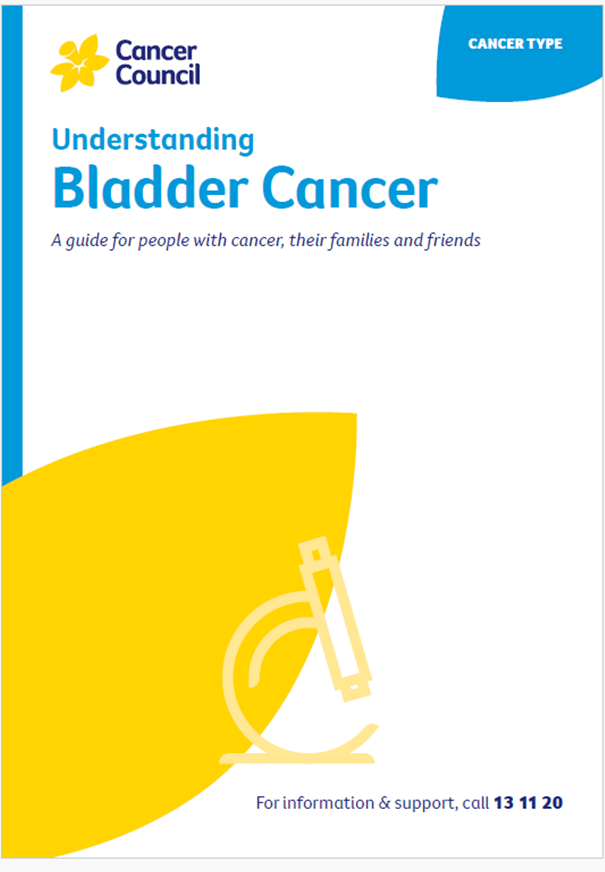- Home
- Bladder cancer
- Diagnosis
- Your health care team
Your health care team
Your general practitioner (GP) will arrange the first tests to assess your symptoms. If these tests do not rule out cancer, you will usually be referred to a specialist (a urologist), who will arrange further tests.
If bladder cancer is diagnosed, the urologist will consider treatment options. They will often discuss your treatment options with other health professionals at what is known as a multidisciplinary team (MDT) meeting. During and after treatment, you will see a range of health professionals who specialise in different aspects of your care.
To find cancer specialists, multidisciplinary teams and hospitals in NSW or ACT, you can visit the NSW Government website CanRefer.
Health professionals you may see
| urologist/ urological surgeon | diagnoses and treats diseases of the urinary systems, as well as disorders in the male reproductive system; performs surgery |
| medical oncologist | treats cancer with drug therapies such as chemotherapy and immunotherapy |
| radiation oncologist | treats cancer by prescribing and overseeing a course of radiation therapy |
| cancer care coordinator | coordinates your care, liaises with other members of the MDT and supports you and your family throughout treatment; care may also be coordinated by a clinical nurse consultant (CNC) |
| nurse | provides care, information and support throughout treatment and administers drugs |
| urological nurse | a urology nurse specialist provides specialist nursing care to people with diseases of the urinary system – they may conduct assessments, administer treatments and provide information and support |
| continence nurse | assesses and educates patients about bladder and bowel control |
| stomal therapy nurse | provides information about surgery and can help you adjust to life with a stoma |
| dietitian | helps with nutrition concerns and recommends changes to diet during treatment and recovery |
| social worker | links you to support services and helps you with emotional, practical and financial issues |
| physiotherapist | helps with restoring movement and mobility; a continence physiotherapist provides exercises to help strengthen pelvic floor muscles and improve bladder and bowel control |
| exercise physiologist | prescribes exercise to help improve your overall health, fitness, strength and energy levels |
| psychologist, counsellor | help you manage your emotional response to diagnosis and treatment |
→ READ MORE: Making treatment decisions for bladder cancer
More resources
Dr Prassannah Satasivam, Urologist and Robotic Surgeon, Epworth Hospitals and Cabrini Hospitals, VIC; Donna Clifford, Urology Nurse Practitioner, Royal Adelaide Hospital, SA; Marc Diocera, Genitourinary Nurse Consultant, Peter MacCallum Cancer Centre, VIC; Dr Renee Finnigan, Radiation Oncologist, Gold Coast University Hospital, QLD; Lisa Hann, 13 11 20 Consultant, Cancer Council SA; Dr Andrew Hirschhorn, Director of Allied Health and MQ Health Academy, MQ Health, Macquarie University, NSW; Anne Marie Lyons, Stomal Therapy Nurse, Concord Hospital and NSW Stoma Limited, NSW; John McDonald, Consumer; Prof Manish Patel, Urological Cancer and Robotic Surgeon, Westmead Hospital, Macquarie University Hospital, and The University of Sydney, NSW; Dr Jason Paterdis, Urological Surgeon, Brisbane Urology Clinic, QLD; Graeme Sissing, Consumer; Prof Martin Stockler, Medical Oncologist, The University of Sydney, Concord Cancer Centre, and Chris O’Brien Lifehouse RPA, NSW.
View the Cancer Council NSW editorial policy.
View all publications or call 13 11 20 for free printed copies.

